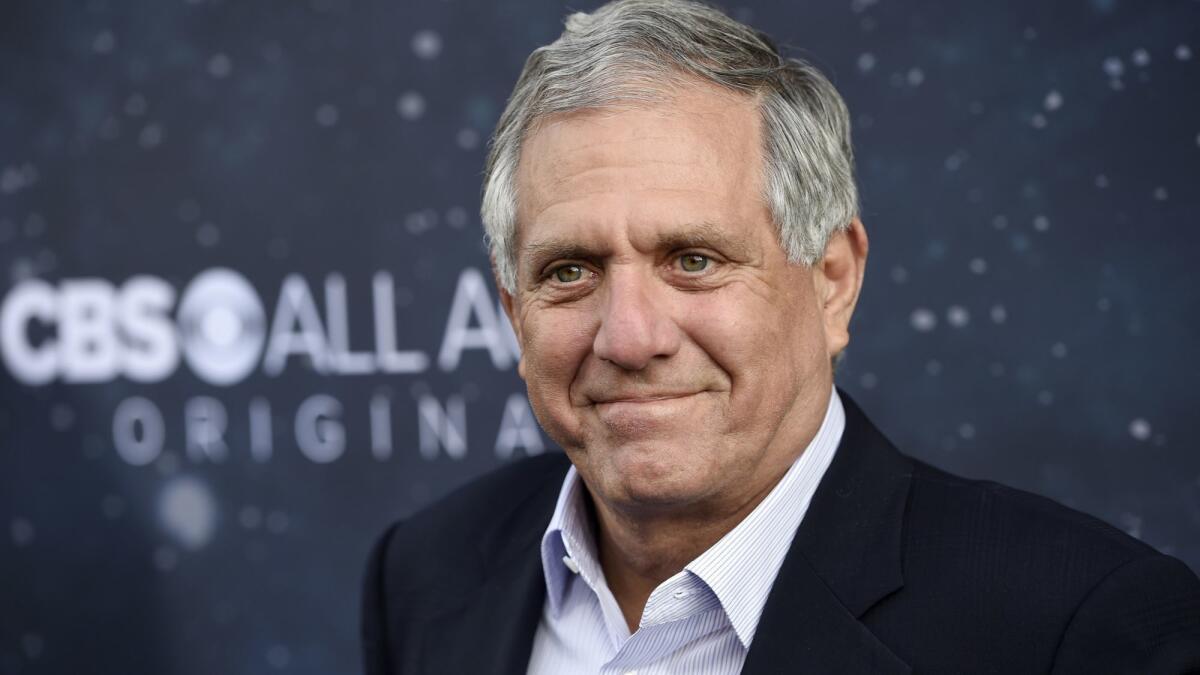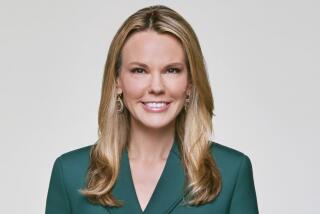CBS’ Moonves skirts explosive allegations, sticks to strong earnings on call with investors

- Share via
Ignoring the swirl of sexual harassment allegations that threaten to end his long and successful career, CBS Chairman and Chief Executive Leslie Moonves was characteristically upbeat Thursday as he ticked off a list of his company’s financial achievements in a call with investors.
Interest in CBS’ second-quarter earnings call was so high that business news channel CNBC televised a live audio feed. Twitter buzzed with anticipation. However, a CBS executive quickly made it clear that they would field only questions about the company’s strong financial performance “in light of pending litigation, and other matters, and on the advice of counsel.”
The juxtaposition was jarring. CBS’ stock has whipsawed since Friday, hours before the New Yorker magazine reported that multiple women said Moonves “forcibly kissed” them decades ago.
“It’s shameful and irresponsible to hide under the lawyers’ skirts,” Jeffrey Sonnenfeld, a professor at the Yale School of Management, said Thursday after CBS’ conference call. “His stock has plunged in the last six days, and he hasn’t explained the reasons why to his investors — the owners of the company.”
This week brought fresh allegations after Los Angeles County prosecutors acknowledged that they had evaluated assault claims last year, but they declined to bring charges because the statute of limitations had expired. The incidents were alleged to have occurred in 1986 and 1988.
The Times reported earlier Thursday that CBS board members learned several months ago that the Los Angeles Police Department had investigated the alleged sexual assault.
Although no charges were filed, Moonves disclosed the existence of a police investigation to a committee of the board, which then hired an outside law firm to investigate the matter, according to two people familiar with the matter who were not authorized to speak publicly.
The outside firm reviewed information about the allegations and police inquiry and concluded that “no further investigation was warranted,” one of the sources said.
But CBS board members are under the microscope over how they dealt with the allegations of sexual harassment by the 68-year-old chief — including when they learned of the various claims and how they responded.
“The board is really in a predicament,” said C. Kerry Fields, professor of business law and ethics at the USC Marshall School of Business. “There is zero tolerance for harassment and discrimination claims, and not addressing it in an affirmative way discredits the judgment of the board.”
Board members have faced criticism from corporate governance experts and others for not taking more aggressive action — such as suspending Moonves — in the wake of last week’s New Yorker report, which contained allegations of six women who claimed Moonves sexually harassed them more than a decade ago. Board members this week said they would “conduct an independent investigation.”
Wednesday night, CBS announced that it had hired two high-powered female attorneys from two separate New York law firms to oversee the investigation into the allegations surrounding Moonves as well as executives within CBS News. Heading the investigation will be Mary Jo White, a former Securities and Exchange Commission chairwoman, and Nancy Kestenbaum, a lawyer with the Covington & Burling firm in New York.
The board “takes these allegations seriously and is committed to acting in the best interest of the company and all of its shareholders,” CBS said in its Wednesday statement.
The CBS board is now focused on making sure the investigation is thorough and spotless, according to one person close to the board who was not authorized to comment publicly. The review, according to the board, would also delve into “cultural issues at all levels of CBS.”
White oversaw the SEC during the Obama administration. Before that, she was the U.S. attorney in the Southern District of New York, one of the nation’s busiest federal court districts because it has jurisdiction over Wall Street. She now leads the Strategic Crisis Response and Solutions Group at the Debevoise & Plimpton law firm.
Kestenbaum also is a former federal prosecutor who has worked as a defense attorney.
“The board should evaluate the culture in which senior management operates,” Fields said. “And the board needs to look in the mirror and see if they were complicit in condoning these actions.”
The L.A. police investigation began in November after an 81-year-old woman told detectives that Moonves sexually assaulted her more than 30 years ago when they both worked at then-television powerhouse Lorimar Productions, the studio behind such hits as “Dallas” and “Knots Landing.” The woman claimed the TV executive, during a 1986 meeting in his office, demanded oral copulation. She told police about another incident, in 1988, when he allegedly exposed himself and assaulted her, sources said.
Los Angeles County prosecutors declined to file charges in the case, saying the alleged incidents occurred three decades ago and were thus beyond the statute of limitations. Prosecutors opted not to pursue the case in February.
It is not clear precisely when CBS board members learned of the police inquiry, but they were aware that the district attorney had decided not to pursue the matter, one of the sources said.
“The board has to separate the noise from the reality,” said Charles M. Elson, director of the John L. Weinberg Center for Corporate Governance at the University of Delaware. “Allegations alone are not a reason to take action: There has to be something serious — and credible — for them to act.”
One knowledgeable person who was not authorized to comment said not all board members were aware of the short-lived police investigation. Informing the full board may not have been a necessary step, Elson said, noting that a public figure such as Moonves can be a target.
“But if the allegations are serious and credible, then it certainly should be a matter for the full board,” Elson said.
Last week, Moonves said in a statement: “I recognize that there were times decades ago when I may have made some women uncomfortable by making advances. Those were mistakes, and I regret them immensely. But I always understood and respected — and abided by the principle — that ‘no’ means ‘no,’ and I have never misused my position to harm or hinder anyone’s career.”
Moonves, who has been CEO since 2006, has long enjoyed the support of most of the 14-member board. Wall Street respects Moonves, too.
CBS shares on Thursday climbed 17 cents, or less than a percent, to $52.72.
During the conference call with analysts, CBS executives kept the focus on the strong financial results: The company posted a second-quarter profit of $400 million, up from $58 million a year ago. Revenue during the quarter climbed 6% to $3.47 billion from a year ago.
The controversy comes at a time when CBS’ board already is deeply divided over the management and future of the company. Since January, Moonves has been at odds with controlling shareholder Shari Redstone over the board’s composition and whether CBS should merge with Viacom Inc., the other media company that the Redstone family controls. The two sides are waging a legal battle for control of CBS.
CBS board members were aware late last year that multiple news organizations were looking into Moonves’ conduct in the wake of the Harvey Weinstein scandal, which exploded in October. The #MeToo movement began after the first wave of stories, which contained allegations that Weinstein had sexually assaulted dozens of women, dating back decades. Women came forward with their stories of past abuse, and reporters at multiple outlets began chasing tips about various Hollywood figures.
Redstone has told board members for several months that she wasn’t happy with the board’s oversight of management, two people familiar with the matter said.
Divisions on the board may have influenced how the investigation was set up — with White and Kestenbaum, who work at two separate New York law firms, overseeing the investigation.
“I have not seen two different law firms used to run a single investigation — and I follow this,” Columbia Law School professor John C. Coffee said Thursday. “It leaves some question as to who is in control of the investigation.”
Twitter: @MegJamesLAT
Twitter: @lacrimes
More to Read
Inside the business of entertainment
The Wide Shot brings you news, analysis and insights on everything from streaming wars to production — and what it all means for the future.
You may occasionally receive promotional content from the Los Angeles Times.












